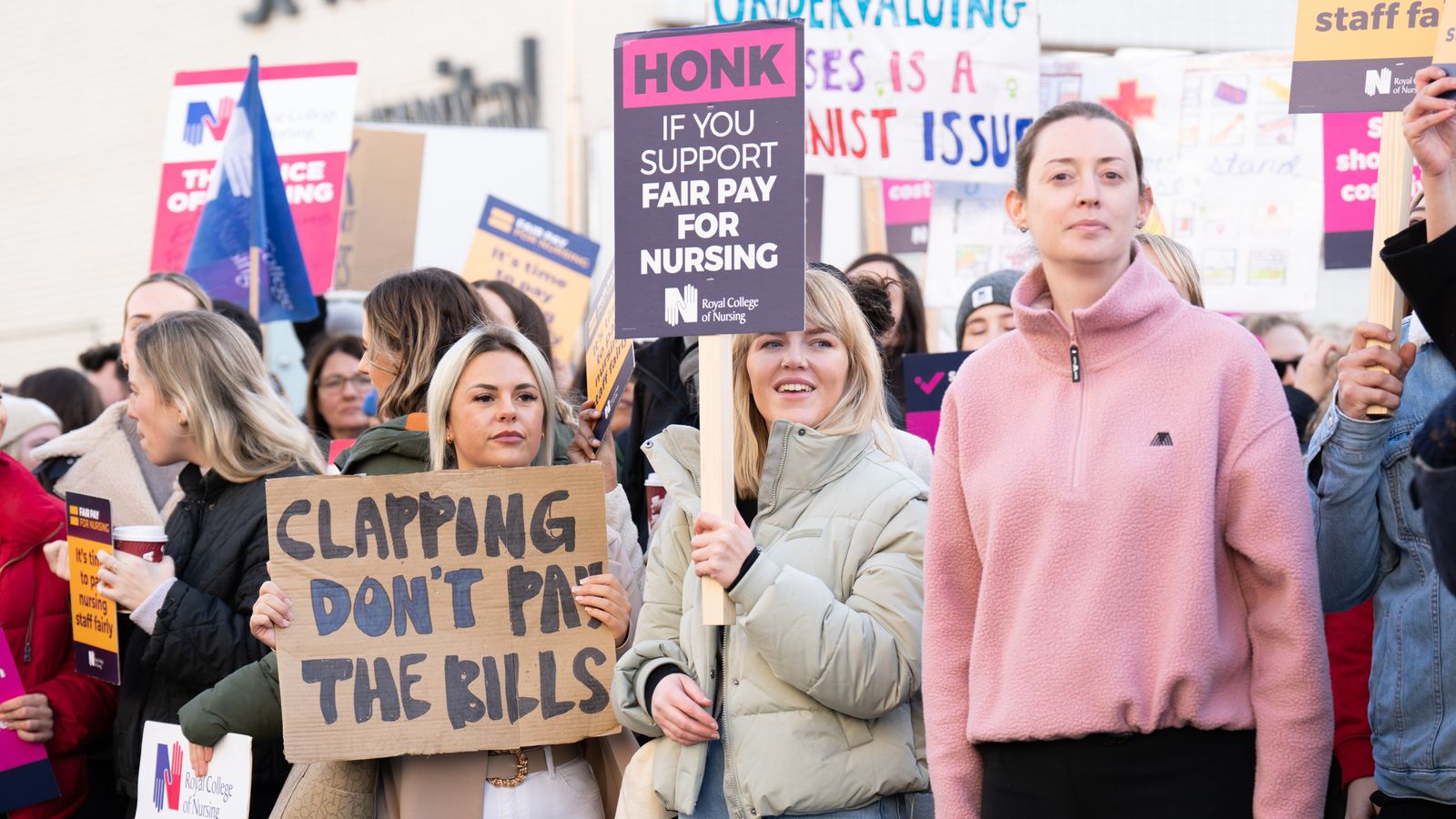The TUC has announced a national protest in response to new anti-strike legislation it says attacks a “fundamental British liberty” and is “almost certainly illegal”.
The “national right to strike day” will be held on 1 February with events taking place across the country, the Trades Union Congress (TUC) said.
It comes after a bill was introduced to parliament on Monday afternoon that will mean unions representing key workers will have to agree to minimum levels of safety and service when their members go on strike.
If you are an NHS worker and would like to share your experiences with us anonymously, please email [email protected]
The TUC, which represents all unions, called the measures “draconian” and vowed to fight them “every step of the way”.
TUC general secretary Paul Nowak said: “The right to strike is a fundamental British liberty – but the government is attacking it in broad daylight.
“These draconian new curbs will tilt the balance of power even more in favour of bad bosses and make it harder for people to win better pay and conditions.
Anti-strike bill: Ambulance unions ‘put people’s lives at risk’ by refusing minimum levels of service, Business Secretary Grant Shapps says
NHS strikes to go ahead after union meeting with health secretary Steve Barclay breaks down
Downing Street ‘considering one-off payment for nurses’ to end strikes after previously rejecting idea
“On February the 1st will we hold events across the country against this spiteful new bill – which is unworkable and almost certainly illegal.
“We will call on the general public to show support for workers taking action to defend their pay and conditions, to defend our public services and to protect the fundamental right to strike.”
The protest was agreed following a meeting with union leaders on Monday afternoon.
Please use Chrome browser for a more accessible video player
The bill, if it gets made into law, will mean some trade union members would be required to continue working during a strike – which the TUC says could be in breach of international law.
“Nobody should lose their job if they take lawful action to win a better deal. But ministers have gone from clapping our key workers to threatening them with the sack,” Mr Nowak said.
“Unions will fights these plans every step of the way – including through parliament and through the courts.”
The legislation puts trade unions and ministers on course for a fresh showdown after months of strikes impacting the public sector.
Steve Barclay, the heath secretary, failed to avert upcoming industrial action in the NHS after talks with union bosses broke down yesterday.
Read More:
When have industries previously gone on strike and what has it achieved?
Unison said there were no “tangible concessions” on pay which would enable Wednesday’s ambulance strikes to be called off while The Royal College of Nursing (RCN) said ministers “have a distance to travel” to avert its second-ever set of strikes on 18 and 19 January.
Unite said any suggestion that a one-off pay reward could be made in exchange for a boost in productivity was “absolutely ludicrous” and physiotherapists also said they would be announcing strike dates later this week despite the talks.
The action comes as the NHS buckles under greater pressure than ever, with ministers insisting the laws are required to ensure patient safety.
Tory MP brands strike legislation ‘shameful’
Grant Shapps, the business secretary, has claimed ambulance unions placed people’s lives at risk when they refused to introduce countrywide minimum levels of service during strikes last month, saying the local-level agreements led to a “postcode lottery”.
Please use Chrome browser for a more accessible video player
The Conservative Party’s 2019 election manifesto already promised a minimum service law for public transport, but the new legislation would extend that requirement to five other areas – the NHS, education, fire and rescue, border security and nuclear decommissioning.
Details of the minimum service levels which will need to be maintained during strikes have yet to be set out.
Downing Street said it was hopeful of passing the Strikes (Minimum Service Levels) Bill this year – but the legalisation is expected to face tough opposition.
A Conservative MP and former minister has already broken ranks to condemn the plan. Stevenage MP Stephen McPartland tweeted it was “shameful, shameful, shameful to target individual workers & order them to walk past their mates on picket line or be sacked”.
Labour has said it would repeal the bill, with deputy leader Angela Rayner telling the Commons the proposal will lead to nurses being sacked and is an “outright attack on the fundamental freedom of British people”.
The TUC said the legislation “will succeed only in escalating disputes and driving workers away from wanting to work in our public services” – as it repeated calls for the government to negotiate a fair pay deal to end the strikes.
As well as the strikes in the NHS, rail workers, civil servants, teachers and firefighters are among those expected to continue or begin striking in 2023 for better pay and conditions.









